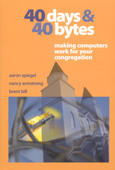Soon after moving to Colchester something happened that caused me a good deal of personal embarrassment. I had gone into the town centre on some errands and, being unfamiliar with the layout of the town, I parked the church minibus I was driving at the time near the bus station. There were no parking restriction signs so I felt comfortable in leaving the vehicle there. Later, as I made my way back to it, I saw that the traffic was at a standstill – something unusual because at
 that time traffic flowed freely through the streets of Colchester. As I neared the bus station I noticed two policemen standing by my minibus.
that time traffic flowed freely through the streets of Colchester. As I neared the bus station I noticed two policemen standing by my minibus.One of them said, ‘Is this your vehicle, sir?’ When I said it was, he told me, ‘Well, you can see what has happened. Though your vehicle is not in a restricted zone, you have parked in such a way that the buses have not been able to make the wide turn necessary for them to get into the bus station. If you had parked it a yard farther on there would have been no trouble. I can see you are a man of the cloth, but I am afraid I will have to report you for this, as it has caused great havoc in the town over the past 15 minutes.’
I apologised and explained that I was new to the town, but this did not prevent me from being called before magistrates a few weeks later and fined. One of the magistrates said, ‘We are going to be lenient because you are new to the town, but we must give you a fine to reflect the seriousness of the situation. You brought the town to a standstill.’ I was fined thirty pounds. Back in the late 1950s that was quite a lot of money. Fortunately, a kind member of the church paid it for me.
Looking for a story, a newspaper reporter from the Colchester Express came to see me the day after my court case to try to get my view of how I had been dealt with at the court. When he arrived he found a fire engine outside our house. It was a fairly cold day and I had decided to light a fire in the front room. As soon as I did so the chimney caught fire and soon flames and clouds of smoke were leaping up in the air. When it had been dealt with, and the reporter had got his story about my holding up the traffic in town, his comment was, ‘One way and another you certainly have let everyone know of your arrival!’ Both incidents were reported in the Colchester Express.
Some time later, the editor of the Express called me and invited me in to his office for a chat. He said, ‘You have only been here a few weeks and your name is known all over town. I wondered if you would like to cash in on your notoriety and write something for our paper now and again?’ Later [I] went back to him with the idea of the ‘One-Minute Sermon.’ He was extremely pleased about this and began to carry it each week. Although I did not get any money for it, the fact that every week I was obliged to sit down and writer in a clear and condensed way, something meaningful and arresting that could be read in just a minute, was good preparation for a writing project I would begin a few years later.
From chapter 17 of My Story, published by CWR 2004












